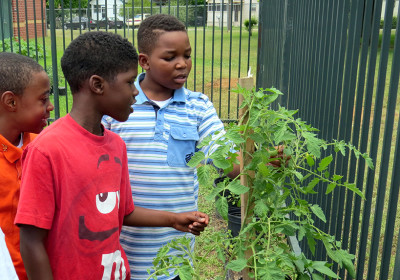Public policy is a complex process with multiple angles. There is a science to understanding how effective policy develops, how effective policy is and how it can be improved.
The National Public Policy Evaluation Center seeks to understand social, economic and environmental impacts of public policy and relays research-based results and solutions to policymakers and the public to help inform their decisions. NPPEC came under the PIE Center’s umbrella when Director Alexa Lamm joined the center in the fall.
Community gardening and childhood obesity
 To help both urban and rural children understand the importance of sustainability and nutrition, as well as how to grow their own food, NPPEC and Florida A&M University are measuring the impacts of community-based gardening education programs.
To help both urban and rural children understand the importance of sustainability and nutrition, as well as how to grow their own food, NPPEC and Florida A&M University are measuring the impacts of community-based gardening education programs.
The project aims to give children a unique environment in community gardens where children can develop positive attitudes about themselves, the environment and healthy behavior.
Critical Thinking Inventory
The reasonable and reflective thought process that leads people to decisions on what to believe or how to act is an important driver of how people form opinions. Critical thinking styles vary significantly among people. The UFCTI, a 20-item questionnaire that takes about 10 minutes to complete, measures the way people think.
UFCTI has been extensively piloted and compared to other cognitive instruments for validity and reliability and will be available in Summer 2013.
Executive Extension
![]() The three-part, self-paced extension program expected to launch in Summer 2013 provides an interactive online environment in which users can learn the tools needed to understand and influence public policy that impact agriculture and natural resources.
The three-part, self-paced extension program expected to launch in Summer 2013 provides an interactive online environment in which users can learn the tools needed to understand and influence public policy that impact agriculture and natural resources.
The online modules incorporate self-assessments, game-based learning, animated characters and a blog to foster interaction. Throughout the program, an emphasis is based not only on the academic background surrounding leadership in public policy but on ensuring the lessons are grounded in learners’ real-life experiences outside the program.

















